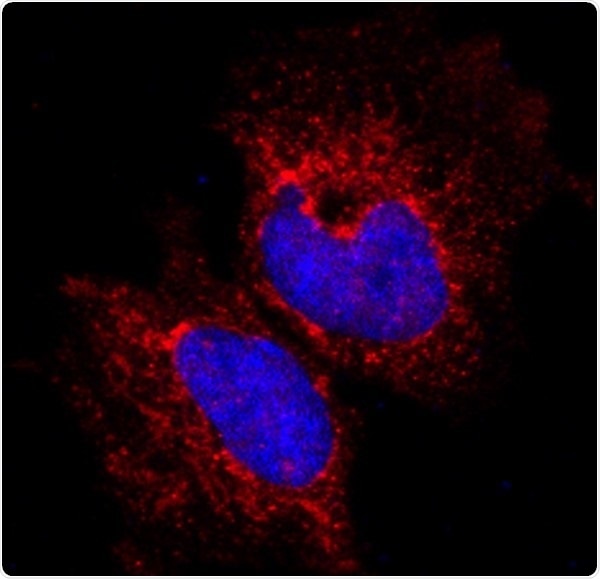Groundbreaking cancer research by the University of South Australia has identified an invasive protein molecule that could be responsible for some of the most aggressive breast cancers.

Aggressive breast cancer cells showing the ZCCHC24 molecules (highlighted in red).
The never-before studied molecule (ZCCHC24) appears to change the structure of breast cancer cells to increase the aggressive nature of the deadly disease. Understanding how it works could stop the cancer from metastasizing to other sites in the body.
Lead researcher, and Laboratory Head at UniSA’s Centre of Cancer Biology, and recipient of the Cancer Council Beat Cancer Project grant, Associate Professor Philip Gregory, says the discovery could provide life-changing information to prevent the spread of breast cancer.
Understanding why some forms of breast cancer spread and others don’t is vital in understanding how to treat breast cancer. In this research, we’re drilling down to look at individual cancer cells and trying to find out what makes them turn from being benign to being aggressive. Once they become aggressive, these cells can go rogue, branching out across the body and making them very difficult to treat. What we’ve discovered is a molecule that appears to be strongly turned on in the most aggressive cancer cells. When we block the action of this molecule, the cells completely change and become far less aggressive. This molecule is particularly abundant in aggressive breast cancers, which can be extremely difficult to treat. By understanding how the molecule works, we could unlock new treatments for the disease.”
Philip Gregory, Associate Professor, UniSA’s Centre of Cancer Biology
Breast cancer is the most common cancer in women worldwide, with more than two million cases across the globe. In Australia, it is estimated that nearly 20,000 new cases of breast cancer will be diagnosed in 2020. It is the second leading cause of death from cancer among women.
Ahead of Daffodil Day on Friday 28 August, Cancer Council SA Chief Executive Lincoln Size says the findings are an exciting step forward in breast cancer research.
This new discovery could transform treatments for breast cancer in the future and help thousands of Australian women. We’re incredibly proud to fund groundbreaking research such as Dr Gregory’s through Cancer Council’s Beat Cancer Project and encourage the community to show their support this Daffodil Day to enable us to continue to fund this critical work.”
Lincoln Size, Chief Executive, Cancer Council SA
Daffodil Day is held across the country on Friday 28 August with donations funding vital cancer research projects across the country.